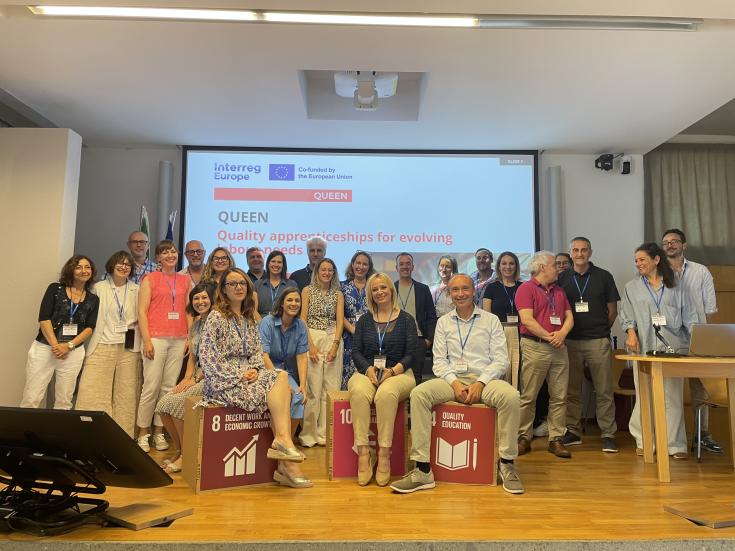Exchange on Quality Apprenticeships in the AI Era in Siena

The Interreg Europe project QUEEN – Quality Apprenticeships for Evolving Labour Needs launched in Siena, Italy, on 11–12 June 2025, hosted at the Santa Chiara Lab, University of Siena. The event marked the start of a joint mission to improve apprenticeship policies in response to changing labour market demands.
Opening the conference, Miriana Bucalossi (Tuscany Region) recalled the project’s roots in Siena in September 2023, developed through close collaboration with local stakeholders. She stressed the strategic role of quality apprenticeships in fostering innovation and inclusion. Interregional cooperation, she noted, offers crucial value through peer learning—especially as AI challenges existing governance models.
Apprenticeships in the Age of AI
Day one featured a conference and exchange on how Artificial Intelligence is reshaping skills, labour markets, and training systems.
Lorenzo Sabatini (ASEV) introduced the QUEEN project, underlining the need to align apprenticeship systems with evolving labour demands and EU frameworks.
The panel “Apprenticeships in the Age of AI” featured leading experts:
-
Anna Zongollowicz (ITC-ILO): Argued AI will reshape—not replace—jobs, and can enhance apprenticeships by improving pedagogy, relevance, and responsiveness. She called for broader skills and stronger ties with industry.
-
Konstantinos Pouliakas (CEDEFOP): Shared results from the 2024 AI Skills Survey: while 42% of workers need AI skills, only 15% have received training. Apprenticeships, he said, can bridge this gap and aid generational knowledge transfer.
-
Tamas Varnai (European Commission, DG EMPL): Presented the European Alliance for Apprenticeships (EAfA) and its 14 quality criteria. The 2025 Action Plan includes webinars, a toolkit for adult apprenticeships, and links with the Pact for Skills.
-
Claudio Balestri (Fondazione SAIHub): Showcased Siena AI Hub initiatives promoting hands-on learning, mentorship, and inclusion. Apprenticeships, he noted, can close both digital and social divides.
The session underscored AI’s impact on fairness, inclusion, and learning quality.
Tuscany: From European Standards to Local Practice
The session “From Global Standards to Local Practice” explored how Tuscany embeds quality into dual apprenticeship models:
-
Simone Cappelli (Tuscany Region) and Prof. Giampiero Cai (University of Siena) outlined a governance model linking public authorities, businesses, and schools.
-
The Quality Apprenticeship Charter, inspired by the European Framework for Quality and Effective Apprenticeships (EFQEA), defines standards for learning outcomes, workplace conditions, and tutor support.
-
The Wine Social Skills Ecosystem, co-developed with OECD-CEDEFOP, applies a skills ecosystem approach to the agrifood sector.
-
Prof. Cai also presented the Farming Lab at Santa Chiara as a model for multi-actor training collaboration.
Wine Technician Apprenticeship: Practice Meets Policy
A standout example is the Wine Technician apprenticeship, a national dual model supported by Tuscany. Offered only in Siena, it features 1,065 hours per year split equally between classroom and in-company training, supervised by both school and company tutors. The model addresses SME needs while reducing skills mismatches.
Regional Policy Snapshots
In an “Elevator Pitch” session, project partners presented their apprenticeship policy instruments:
-
Ilfov Region (RO): Education and Employment Programme (PEO) – supports dual VET through ESF+.
-
Zenica-Doboj Canton (BA): Development Strategy 2021–2027 – connects apprenticeships to regional development.
-
Cork County (IE): Local Economic and Community Plan – promotes inclusion and sustainability.
-
Basque Country (ES): Education Guidance Plan 2023–2026 – emphasises skills anticipation.
-
Southwest Finland: Regional Strategy 2040+ – targets innovation and adaptability.
-
South Moravian Region (CZ): Long-term Education Plan – supports lifelong learning.
This dynamic format encouraged future bilateral learning exchanges.
Study Visit: Mazzei Winery
Participants visited Mazzei Winery, a key partner in Tuscany’s dual system. The visit demonstrated how apprenticeships can thrive in rural sectors by blending innovation, heritage, and hands-on training.
Tools, Coordination, and Next Steps
Day two focused on internal project coordination, featuring a workshop on applying EFQEA and ILO Recommendation 208 to evaluate apprenticeship systems. The session will inform upcoming regional consultations. Partners also discussed communication and management during the Steering Group meeting.
With strong foundations now in place, the QUEEN project moves forward to support regional policy improvement. In the coming years, partners will continue sharing and adapting successful practices, ensuring apprenticeships remain a strategic response to Europe’s evolving labour needs.
